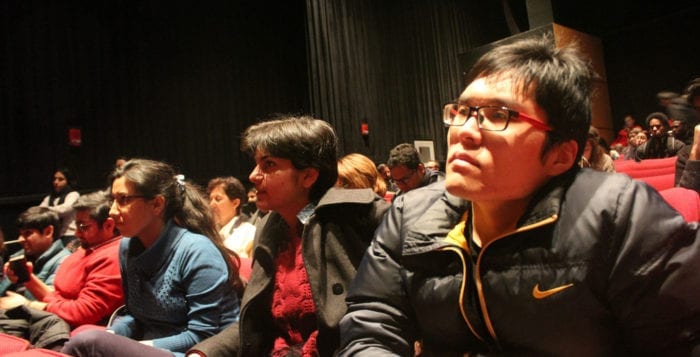Stony Brook University students, many of them international, poured into the Charles B. Wang Center on campus last week to voice their concerns and seek guidance following President Donald Trump’s (R) controversial executive order signed Jan. 27 which put a temporary freeze on travelers entering the United States from seven Muslim-majority nations.
A 19-year old student from Yemen, one of the seven countries targeted under the ban, said he’s afraid of being detained if he were to travel through John F. Kennedy International Airport for spring break. He asked not to be identified because of safety concerns.
A 24-year-old Muslim student from Bangladesh wanted to know if she’d be able to see her family this year.
A 22-year old student from Pakistan said he’s no longer interested in finding a physics job in the United States because, as he put it, “it’s just not an environment I want to be in.”
On Feb. 1, less than a week after Trump signed the order to ban citizens of the seven nations from entering the U.S. for 90 days, and all refugees for 120 days —the order has since been temporarily halted by a federal appeals court, though the U.S. Justice Department filed an appeal of the ruling — the university hosted an information session with two New York City-based immigration lawyers, Alexander Rojas and Eric Lorenzo of Barst Mukamal & Kleiner LLP.
According to Dr. Jun Liu, SBU’s Vice Provost for Global Affairs and Dean of International Academic Programs and Services, the session was organized by SBU President Dr. Samuel Stanley to affirm the university’s “commitment to diversity, strong values of inclusiveness, and campus environment that welcomes all.”
The legal experts addressed and interpreted the immigrant reform, which Rojas described as “startling,” as it stood on the day, and fielded questions from those in attendance. Representatives from the offices of Visa and Immigration Services and Dean of Students were also on hand to offer support and answer questions.
Rojas repeatedly advised students currently holding visas from any of the seven affected countries — Iran, Iraq, Libya, Somalia, Sudan, Syria and Yemen — to remain in the U.S. until the end of the 90-day period, April 27, because, as he said, “there is no guarantee that you’ll be allowed re-entry into the [U.S.].”
The three main student visas are F-1, H-1, and J-1, nonimmigrant visas for those studying, those in “specialized occupations,” and those wishing to take part in work-and-study-based exchange and visitor programs, respectively.
According to Lorenzo, the only type of visa excluded from the executive order are G-1, or diplomatic, visas, which are typically for representatives of foreign governments within the United Nations or foreign embassies within the U.S.
But Rojas, who acknowledged there’s still plenty of uncertainty hanging over the ban in terms of its function and development, said those within immigration law anticipate Trump might extend the 90-day period and implement considerations with regards to the countries listed, something the order already laid out as a possibility.
According to the lawyer, an unconfirmed draft with additional countries for the travel ban list had been circulating. The rumored additional countries, Rojas said, are Egypt, Lebanon, Afghanistan, Pakistan, Colombia, Venezuela, Philippines, and Mali.
“It would be prudent to not travel until there’s further guidance with regards to what the White House is going to do with respect to these additional countries proposed on that [supposed] list,” he said. Rojas added he’s not sure of the rationale behind any of the nations currently on the list, or the ones speculated to be in danger of being placed under similar restrictions.
The student from Bangladesh, who would only identify herself as Adrita, was told by Rojas that since her native country is not currently on the travel ban list, she should have no concerns about traveling back home to see her family.
While the 24-year-old genetics student admitted she’s glad to know she won’t be affected by the ban, she called the whole situation unfair.
“Even though I’m not from any of the affected countries, the ban seems to apply to Muslims…so obviously I’m concerned,” Adrita said. “Pakistan is one of the [possible] countries, and Pakistan is right next to Bangladesh. My parents told me ‘forget it, don’t travel, what if you’re told to come back to us?’ I’m doing a PhD here; I can’t just leave.”
Trump has insisted since the roll out of the order it’s not a Muslim ban but a security measure to prevent threats of terrorism.
“America has always been the land of the free and home of the brave,” the President said in a statement. “We will keep it free and keep it safe…to be clear, this is not a Muslim ban…this is not about religion — this is about terror and keeping our country safe.”
Daud Khan, 22, from Pakistan, said he anticipated this sort of situation upon Trump’s election.
“I was just home [in Pakistan] in December for my brother’s wedding and I made it a point to return before Trump’s inauguration so I arrived Jan. 19 to be on the safe side,” he said. “Because you don’t know what he’s going to do.”





